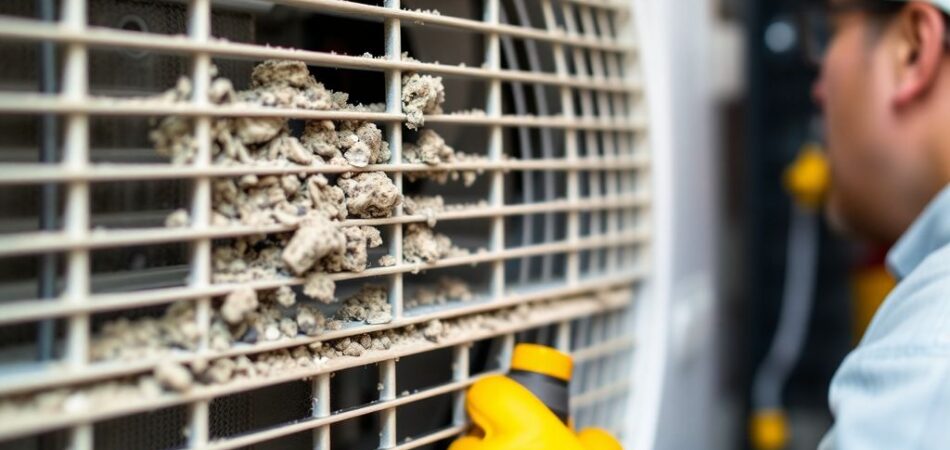
Air conditioning is one of those things we often take for granted—until it breaks down. When the heat hits, the last thing you want is for your AC to stop working. There are a few common reasons why air conditioning systems fail, and the good news is, many of them can be avoided with some simple steps. Let’s look at what usually goes wrong and how you can keep your AC running smoothly.
Key Takeaways
- Regularly change your air filters to keep the system clean.
- Schedule annual inspections to catch issues early.
- Be mindful of your electrical connections to avoid overloads.
Frequent Maintenance Issues
Neglecting Regular Filter Changes
Okay, so let’s talk about air filters. Seriously, how often do we actually change them? It’s one of those things that’s easy to forget, but it can cause big problems down the road. A dirty air filter restricts airflow, making your AC work harder and less efficiently. Think of it like trying to breathe through a clogged mask – not fun, right?
- Reduced airflow
- Increased energy consumption
- Potential for frozen evaporator coils
If we don’t change the filter regularly, dust and debris build up, and that can lead to all sorts of issues. The AC unit has to work harder to pull air through, which means it uses more energy and costs us more money. Plus, it can cause the evaporator coils to freeze up, which is a whole other headache. We should aim to change the filter every 1-3 months, depending on how often we use the AC and whether we have pets or allergies.
Ignoring this simple task can lead to significant performance degradation and costly repairs. It’s a small investment of time and money that pays off in the long run.
Ignoring Annual Inspections
Annual AC inspections are like yearly check-ups for our cooling systems. We might think everything’s fine, but a professional can spot potential problems before they turn into major breakdowns. During an inspection, a technician will check things like refrigerant levels, electrical connections, and the overall condition of the unit. They’ll also clean the coils and make sure everything is running smoothly. It’s easy to skip this, especially if the AC seems to be working fine, but it’s a really good idea to schedule an inspection every year. It can save us a lot of money and hassle in the long run. We can think of it as preventative care for our AC unit. It’s better to catch small issues early than to deal with a complete system failure during the hottest days of summer.
Here’s a quick rundown of what an inspection usually includes:
- Checking refrigerant levels
- Inspecting electrical components
- Cleaning coils
Electrical Failures and Overloads

Electrical issues can really mess with your AC, and honestly, they’re often overlooked until it’s too late. We’ve seen our fair share of units go down because of something electrical. It’s not always about the refrigerant or the compressor; sometimes, it’s just plain old wiring.
Faulty Wiring and Connections
Loose or corroded wiring is a common culprit in AC breakdowns. It’s something we see all the time. Over time, connections can loosen due to vibrations or temperature changes. Corrosion can also build up, especially in humid environments. This increases resistance, which leads to overheating and potential failure. We always recommend checking the wiring during maintenance. It’s a simple thing that can save you a lot of trouble.
- Check for loose connections.
- Look for signs of corrosion.
- Ensure proper insulation.
Faulty wiring can also cause erratic behavior in your AC unit. You might notice it turning on and off randomly, or the fan might not be running at the correct speed. These are all signs that something is wrong with the electrical connections.
Tripped Circuit Breakers
Circuit breakers are there to protect your AC from overloads, but frequent tripping can indicate a problem. If your AC keeps tripping the breaker, don’t just keep resetting it. That’s a recipe for disaster. It’s a sign that something is drawing too much power. It could be a failing compressor, a short circuit, or even just a dirty air filter making the unit work harder than it should. We suggest investigating the cause before you end up with a bigger issue. Ignoring it can lead to serious damage, or even a fire. Safety first, always.
- Check the amperage rating of the breaker.
- Inspect the AC unit for signs of damage.
- Consider having an electrician evaluate the circuit.
Refrigerant Problems
Low Refrigerant Levels
Low refrigerant is a pretty common issue we see. It usually means your AC isn’t cooling as well as it should, or maybe not at all. It’s kind of like your car running low on gas; the system just can’t do its job properly. We often get calls about this, and it’s usually a sign of something else going on, like a leak. Ignoring it can lead to bigger problems down the road, like a burnt-out compressor, which is a much pricier fix. So, keep an eye out for weak cooling; it’s a red flag.
Refrigerant Leaks
Refrigerant leaks are a pain, and they’re not always easy to spot. They can be tiny, but over time, they cause a significant drop in your AC’s performance. We use special tools to find these leaks, like electronic detectors and UV dyes. If we find a leak, we’ll fix it and recharge the system. Here are some things to consider:
- Regular checks can catch leaks early.
- Listen for hissing sounds near the unit.
- Keep an eye on your energy bills; a sudden spike could indicate a problem.
Dealing with refrigerant leaks promptly is important for both the environment and your wallet. Leaks not only reduce the efficiency of your AC system but also release harmful substances into the atmosphere. Addressing these issues quickly can prevent further damage and ensure your system operates efficiently.
Wrapping It Up
So, there you have it. Air conditioning breakdowns can really throw a wrench in your plans, especially during those hot summer days. By keeping an eye on the common issues we talked about, like dirty filters or low refrigerant levels, you can save yourself a lot of hassle. Regular maintenance is key—think of it like getting your car tuned up. A little attention goes a long way. If you notice something off, don’t wait too long to call a pro. Trust me, it’s better than sweating it out while waiting for a repair. Stay cool, and take care of your AC!
Frequently Asked Questions
How often should I change my air filter?
You should change your air filter every one to three months. This helps keep your air conditioning running smoothly.
What can I do to prevent my AC from breaking down?
Regularly check and change the air filter, schedule yearly inspections, and keep the outside unit clean and clear of debris.
What should I do if my air conditioner is not cooling?
First, check if the thermostat is set correctly and if the air filter is clean. If it still doesn’t cool, call a professional to check for issues.
